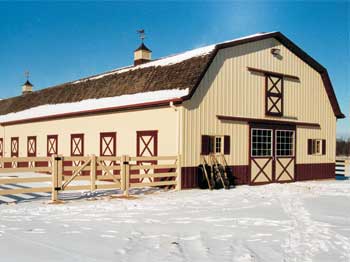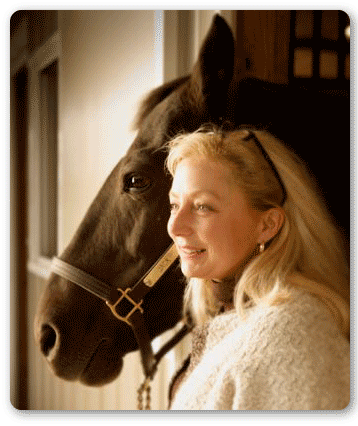Winterizing Your Barn

If you use automatic waterers, it's time to hook up and test the heating elements. Pull out the heated water buckets and tank heaters, checking to make sure that all cores are still in good shape. Fill the basins of the waterers and put some water in your buckets and tanks, then test with your finger to make sure you are not getting an electrical shock. It may be more annoying than painful, but it could still deter a horse from drinking. Horses need to keep their water intake up in the winter, just like in the summer, and you don't want your horse to get dehydrated.
Warmed water is more inviting than cold water, but if it's not possible to give warm water, then make sure that ice is broken regularly so your horse can get to the water. Insulated bucket holders work great if you don't have access to electricity in the barn. Black rubber buckets are a good option for watering in the winter, as they are less likely to crack than plastic buckets if you need to give them a good ''whack'' to break ice. Setting black rubber buckets where they are exposed to the sun helps thaw the ice as the black absorbs the heat more readily. Make sure to have a couple of spare buckets so that while one set is thawing, the other set will have fresh water.
While your horse may be spending more time indoors in the colder months, make sure his stall or shelter has no splintered boards or loose nails. Splinters may not be noticeable to the eye, so run your hand carefully over the walls. Your hands may find something your eyes didn't. Make sure hayracks and feed pans are secure. Cheap, plastic feed bins may crack in the cold; watch for sharp edges and replace if necessary. Make sure that there is enough bedding down to keep your horse from lying directly on the floor. While stall mats will help insulate the floor, don't cut back on bedding. The bedding provides warmth and absorbs urine.
Make sure to keep stalls picked out as usual. Some less-motivated horse owners might buy into the myth that horses like to lay in their manure because it helps keep them warm. This is simply not true and is poor justification for not cleaning stalls. Given the choice, horses will lie down in a clean area; just watch where they rest when they're outside. What's more, manure will freeze into rock-hard balls that surely cannot be comfortable to lie on. A clean stall is not only healthier, but is also more comfortable. Your horse's level of comfort is defined by all his senses, including the sense of smell. Ammonia build-up will become more noticeable when the barn is closed up to keep out the cold.
Stall mats are a good option and great investment for the long term. There are good commercial stall-dry products that can help when cleaning wet spots. Lime can be used, but there are much less toxic products on the market today that are also easier to work with. Check with your local feed store to see what they carry. Indoor riding arenas see more usage in the winter, as well. Take the time now to check your footing and add or replace as necessary. A good dust-down product is a wise investment for your indoor arena. These products greatly reduce the time and energy spent on maintenance. Dust can make it hard to breathe for both horse and rider, and dust can be irritating to eyes and lungs. Dust-down products can make grooming the arena easier, too. Less dust worked up means less time waiting for dust to settle and more time riding.
Little things, like warming your horse's bit, make for an easier winter on your horse.
If your tack room is not heated, be extra careful when tacking up. That saddle blanket can be c-c-c-cold! If your tack room is heated, it becomes more inviting to rodents who are looking for a winter home. Be careful in your choice of rodent control; a poisoned rodent can crawl off and die in an inaccessible place and cause a really horrible smell. Traps can catch fingers and the barn dog's nose. Humane, non-offensive rodent control is a sign of a well-managed barn. It should go without saying that all fire extinguishers need to be checked and fresh batteries installed in smoke detectors. Clear out cobwebs from the barn. In the summertime they are great fly control; in the winter they can become dry, dusty fire hazards.
By taking a few minutes today, while the weather is still reasonably warm, you'll be able to get your pre-winter barn inspection done in no time. Repairs can be made without the bulkiness of winter coats and gloves. Your horse will have a safer, healthier, and more comfortable environment. You, and he, will be able to rest easier through the winter.
 Debbie has over 45 years experience with horses and equine-related businesses. She has owned, trained, boarded horses and run stables at various times in her career. She is a certified fence installer, has given balanced riding lessons, and has shown horses in Western, Western Pleasure, Trail, English, Hunter/Jumper, Fox Hunting, Hunter Trials, Dressage and driving classes. Debbie has been involved in foaling, and just about every aspect of horse ownership possible, and she welcomes your questions and comments. If you are interested in using any articles by Debbie, please send her and email.
Debbie has over 45 years experience with horses and equine-related businesses. She has owned, trained, boarded horses and run stables at various times in her career. She is a certified fence installer, has given balanced riding lessons, and has shown horses in Western, Western Pleasure, Trail, English, Hunter/Jumper, Fox Hunting, Hunter Trials, Dressage and driving classes. Debbie has been involved in foaling, and just about every aspect of horse ownership possible, and she welcomes your questions and comments. If you are interested in using any articles by Debbie, please send her and email.
RAMM Fence Systems, Inc. makes every effort to provide reliable and useful information on horse health, care and products. The statements made on this website are based on years of experience with horses, however, they are based on generalized situations and should not replace diagnosis or treatment by a veterinarian or consultation by a professional. RAMM Fence Systems, Inc. does not assume any legal responsibility. Readers should always consult qualified health care providers for specific diagnosis and treatment
